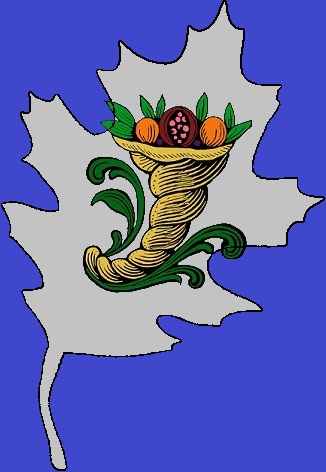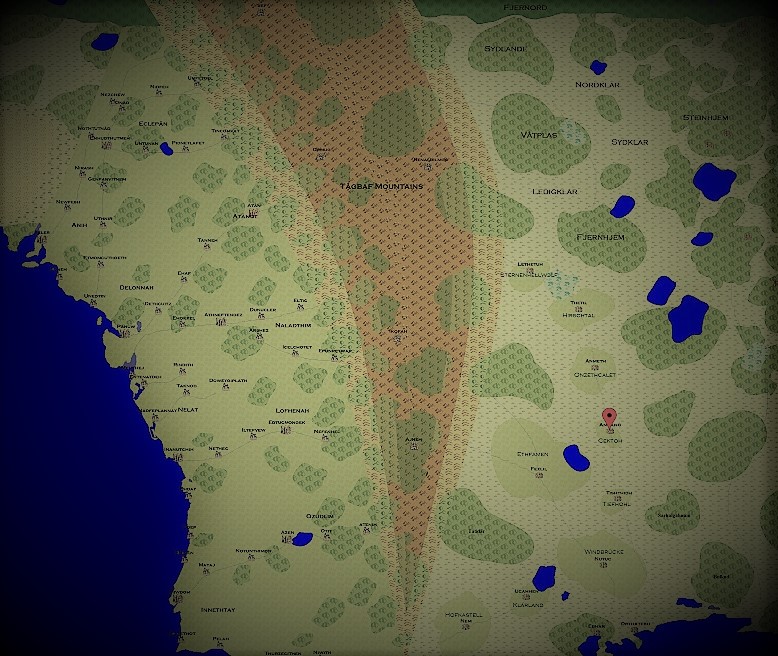Tatidär
The oldest of the three elven kingdoms in the Frontier Lands, Tatidär is a thriving prosperous kingdom located on the edge of the Tågbaf mountains. Situated along the Nahe river in the eastern part of the Frontier Lands the kingdom engages in trade with Ethfamen, Windbrücke, Klarland and Hofkastell. It is best known for the Ajädhev Trees, which produce a plum-like fruit that is in high demand, in markets as far away as the Old Kingdoms.
Structure
Hayyel Aysannlara is the ruler of the kingdom and she rules it in the elven style, which means there isn’t layers of bureaucracy and lesser nobles under her. Instead each community is left to run itself usually in a semi-democratic fashion. Once a year each community prepares a gift as tribute to the monarch and once a year Hayyel tours the kingdom to receive these gifts.
Public Agenda
The agenda of Hayyel and Tatidäris first of all security. Existing in the shadow of the Tågbaf mountains Tatidär faces constant raids from the orcs, giants and other dangers found in those peaks. So Hayyel maintains the largest elven military in the Frontier Lands. Secondly Hayyel, unlike some elven rulers wishes to expand trade and to an extent tourism. He wishes to bring in more revenue as she is continually upgrading the kingdoms defenses. Finally she looks to expand the kingdom. While Tatidär is already one of the largest of the Frontier Land Kingdoms, like many rulers she seeks to expand her kingdom not for the power it would bring her, but because she wants to see the elven philosophy of living in harmony with nature to spread.
Assets
For an elven kingdom Tatidär is relatively wealthy. This wealth is not so much in material goods though but in natural beauty. Still it does have plenty of material wealth, mostly in the stores of well-crafted items. Tatidärian craftsmen produce some of the most valuable and sought-after items, particularly musical instruments, and owning a Tatidärian instrument is a sign of status for many a bard. In addition, Tatidär is a fruitful land and produces an abundance of fruit, in particular the Ajädhev fruit, is particularly valuable as it grows nowhere else. The borders of the land are protected by elven magic, and numerous elven sanctuaries are being constructed to provide protection from invasion and raiders. The nation has vast arsenals of elven weapons, stored throughout to use in defense, and much like the instruments the ravenwood bows of Tatidär are much sought after (and seldom exported).
History
Tatidär was founded a little over a century ago, when Hayyel Aysannlara, a magus, decided to retire from adventuring and found a small kingdom in a patch of woodland she her party had explored. She led a band of elven settlers from the elven home of Dadmaynan establishing the settlement of Bishara, the first elven settlement in the Frontier Lands. The land she had discovered was bountiful, and many elves migrated there, not just from Dadmaynan but also from the dwindling land of Atánot in the New Kingdoms. In addition, the elves there have proven fruitful having more children then the elves anywhere else in Arda.
Since its founding Tatidär has had a relatively peaceful existence with the exception of the war of 678 when an army or orc and giants led by the fire giant king Günnar. In the 678 a horde of orcs and giants descended on the southern Frontier land kingdoms. Tatidär was almost overrun with most of the communities surrounded and cut off from each other. The war ended when the dwarven warrior Thoraim slew Günnar, and the invasion fell apart. It still took the elves several years to clear out all the remaining orcs and giants from their lands.
The war of 678 was the last major incursion Tatidär has faced. The nation has focused since then on establishing trade and mutual defense treaties with its neighbors and has concluded a number such treaties and is currently in negotiations with both Ethfamen and Windbrücke.
Since its founding Tatidär has had a relatively peaceful existence with the exception of the war of 678 when an army or orc and giants led by the fire giant king Günnar. In the 678 a horde of orcs and giants descended on the southern Frontier land kingdoms. Tatidär was almost overrun with most of the communities surrounded and cut off from each other. The war ended when the dwarven warrior Thoraim slew Günnar, and the invasion fell apart. It still took the elves several years to clear out all the remaining orcs and giants from their lands.
The war of 678 was the last major incursion Tatidär has faced. The nation has focused since then on establishing trade and mutual defense treaties with its neighbors and has concluded a number such treaties and is currently in negotiations with both Ethfamen and Windbrücke.
Demography and Population
Total population: 1,578,208 (Elves - 1,515,080, Gnomes - 31,564, Others - 31,564)
Military
Tatidär doesn’t have a standing army. However aselves are geerally trained from a young age with bows, longswords and rapiers they have a powerful militia that can be called up at a moment’s notice.
Religion
The elves are a freedom loving people, and as such Tatidär has no official religion, the inhabitants being free to worship the gods they choose. The most popular deities worshipped in the nation are Arammu, Bahamut, Eresu, Mudutu, Narum, Sinnis, and Vaalea, though almost all the gods with the exception of evil deities have followers. Many elves are also followers of the Green Faith, though less than many would expect.
Foreign Relations
Tatidär has good relations with Ethfamen, Klarlnd, and Hofkastell, and routinely trades with the three nations. They are on fairly good terms with Windbrücke though they’re a little nervous about Wynnstan’s desire to create a standing army. They are on good terms with the free city of Etef routinely trading with them down the Nahe river. Etef is also the primary port of entry for elves emigrating to Tatidär. There relations with Tiefhohl are strained owing to the disagreement between Tiefhohl and Sarhólgahnúm due to the latter’s annexation of Annatow forest. There relations are close with Sarhólgahnúm as Inaedra, Sarhólgahnúm’s coregentis Hayyel’s younger sister.
Agriculture & Industry
Tatidär has a lot of craftsmen producing items for export. Musical instruments are a big business for them, but other crafts are produced as well, especially wooden crafts. Tatidarian crafts are highly sought after but come out in a trickle as elves take their time producing crafts. Tatidär produces much more agricultural products than crafts. The land is fruitful, however elves unlike other races don’t clear land for farming, rather they encourage the land to produce what they need. This allows them to produce more with less land and produce enough for export despite not practicing large scale agriculture like other races. Mostly they produce fruits, nuts, and berries, the small amount of vegetables they produce aren’t usually exported, and they don’t grow cereals on any large scale.
Trade & Transport
The elves of Tatidär don’t build roads, preferring to follow the twisting paths of the forest and allowing nature to dictate their course. Elves don’t believe in hurrying so have no need for direct routes and enjoy wandering and enjoying natural beauty. They also eschew roads for it hinders the movement of invaders if there are no roads. The rare elf that is in a hurry rides a hippogriff, and the elves breed them much the way humans breed horses. There is very little internal trade as most elven communities are self-sufficient. External trade consists primarily of agricultural goods and crafts.
Education
In Tatidär, as in most elven lands, education is not a formal thing. Young elves are taught their letters and numbers when they become curious about reading. Likewise, other skills are taught as the young elves express an interest. In the century or so of childhood elves have time to try lot of different skills, and most will stick with a few long enough to become proficient. With their long lives and lengthy childhoods elves see no need to rush things like education, there’s plenty of time to learn and enjoy life.
Infrastructure
Elves don’t build roads like other races nor do they build aqueducts or sewers, preferring to live in harmony with nature rather than subdue it like other races. So there isn’t much in the way of infrastructure in Tatidär. However given their history of invaders from the Tagbåf mountains they have “constructed” a number of sanctuaries throughout the nation for citizens to shelter in during times of invasion.

Founding Date
620
Type
Geopolitical, Country
Capital
Demonym
Tatidärians
Leader
Head of State
Government System
Monarchy, Crowned Republic
Power Structure
Autonomous area
Economic System
Market economy
Major Exports
Tatidär trades primarily in agricultural goods, particularly fruits and nuts. They also export quite a but o honey. After agricultural products crafts are large export for Tatidär. Wooden crafts are exported in small numbers, musical instruments and carved utensils especially with small amounts of artwork. One thing they do not export is weaponry, particularly their ravenwood bows. They export some raw timber, particularly cedar, oak, and cherry. A few enterprising elves have begun cultivating flax exporting both linen cloth as well as finished clothing items. Elven jewelry is another popular export.
Major Imports
Tatidär imports a lot of steel and granite from the dwarven kingdom of Ajneh, Salt and seafood are imported from Etef on the coast. Cotton is imported from Windbrücke and certain textiles are imported from Ethfamen. In addition wool is imported from various locations, as well as other materials.
Location
Controlled Territories
Neighboring Nations
Notable Members
Remove these ads. Join the Worldbuilders Guild









Comments